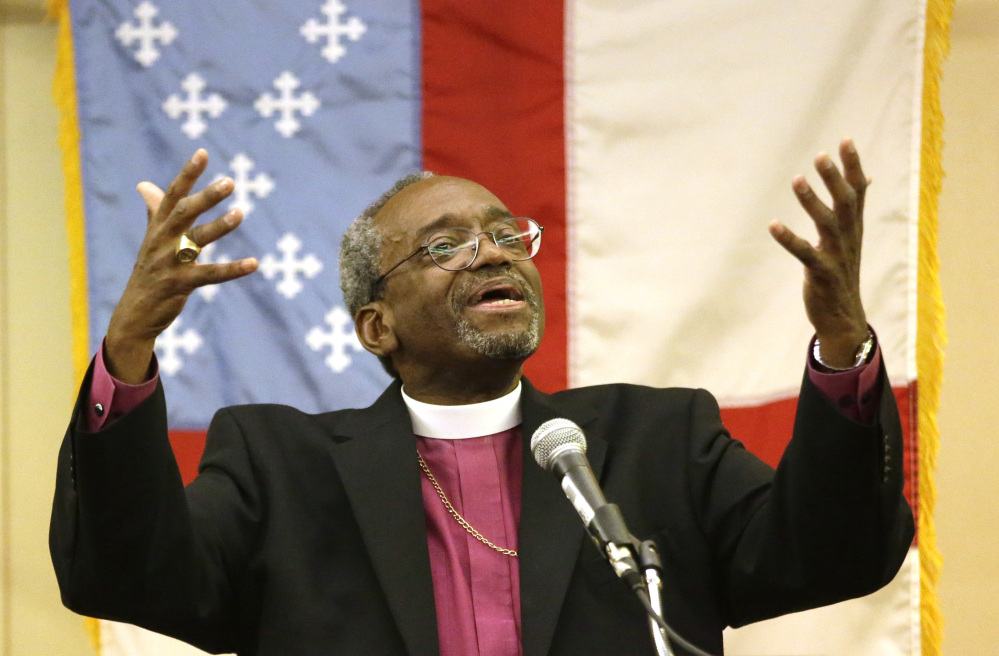NEW YORK— The Episcopal Church, whose history is entwined with the founding of the United States, is installing its first black national leader this weekend.
Presiding Bishop-elect Michael Curry, who comes to the job after nearly 15 years leading the Diocese of North Carolina, was elected last summer to succeed Presiding Bishop Katharine Jefferts Schori, the first woman leader of the church. Her nine-year term ends Sunday, when Curry formally steps in, during a ceremony at the Washington National Cathedral.
Curry takes leadership of the New York-based denomination after years of membership losses and amid ongoing tensions among fellow Anglicans over Episcopal support for gay rights and same-sex marriage. His installation also comes at a time of renewed national attention to racism, after the shooting death of Michael Brown in Ferguson, Missouri, and the massacre of nine black congregants at a Charleston, South Carolina, church.
Curry, 62, who has two daughters with his wife Sharon, recently spoke with The Associated Press about religion, social change and his hopes for the nearly 1.9 million Episcopalians.
SPIRITUAL PATH
Curry was born in Chicago and raised in Buffalo, N.Y., where his father, the late Rev. Kenneth Curry, was rector of an important African-American parish, St. Philip’s Episcopal Church.
Curry’s mother, Dorothy, died when he was in junior high school, so his grandmother, who he described as a “rock-ribbed Baptist,” helped raise him. He said her spirituality profoundly shaped him, and made for lively religious discussion between her and his father. He also saw an example in his father’s activism, including his help organizing a boycott to desegregate Buffalo schools.
As an undergraduate in the 1970s at Hobart College in Geneva, N.Y., Curry planned to become a lawyer and eventually run for public office until he was overcome by a calling to the Episcopal priesthood.
His father cautioned him that the ministry would not be an easy life, but Curry felt as a religious leader, he could help bring about deeper, longer-lasting social change. He went on to earn a master’s degree from Yale Divinity School, and then serve parishes in North Carolina, Ohio, and Maryland, before he was elected bishop of North Carolina in 2000.
Curry cites two key role models:
The first, Verna Dozier, was a high school English teacher who became a highly sought after lay religious educator and speaker in the church starting in the 1950s. Her talks were collected in the book “The Dream of God.”
“She taught Episcopalians to read the Bible,” Curry said.
The second is Dietrich Bonhoeffer, the German Lutheran pastor and author of “The Cost of Discipleship,” who resisted the Nazis, helped rescue Jews and was executed in a concentration camp.
REVIVING THE CHURCH
Curry takes charge at a time when fewer Americans are formally affiliating with a religious group, contributing to diminishing membership in the Episcopal Church and other liberal Protestant groups, as well as in some conservative denominations, such as the Southern Baptist Convention.
Membership in the Episcopal Church has dropped by 18 percent over the last decade alone.
RACISM
The Episcopal Church, the faith home of many Founding Fathers and U.S. presidents, has been trying to confront its own history of racism. Many Episcopalians, including George Washington, were slaveholders whose donations were used to build churches, cathedrals and schools.
Copy the Story LinkSend questions/comments to the editors.



Success. Please wait for the page to reload. If the page does not reload within 5 seconds, please refresh the page.
Enter your email and password to access comments.
Hi, to comment on stories you must . This profile is in addition to your subscription and website login.
Already have a commenting profile? .
Invalid username/password.
Please check your email to confirm and complete your registration.
Only subscribers are eligible to post comments. Please subscribe or login first for digital access. Here’s why.
Use the form below to reset your password. When you've submitted your account email, we will send an email with a reset code.